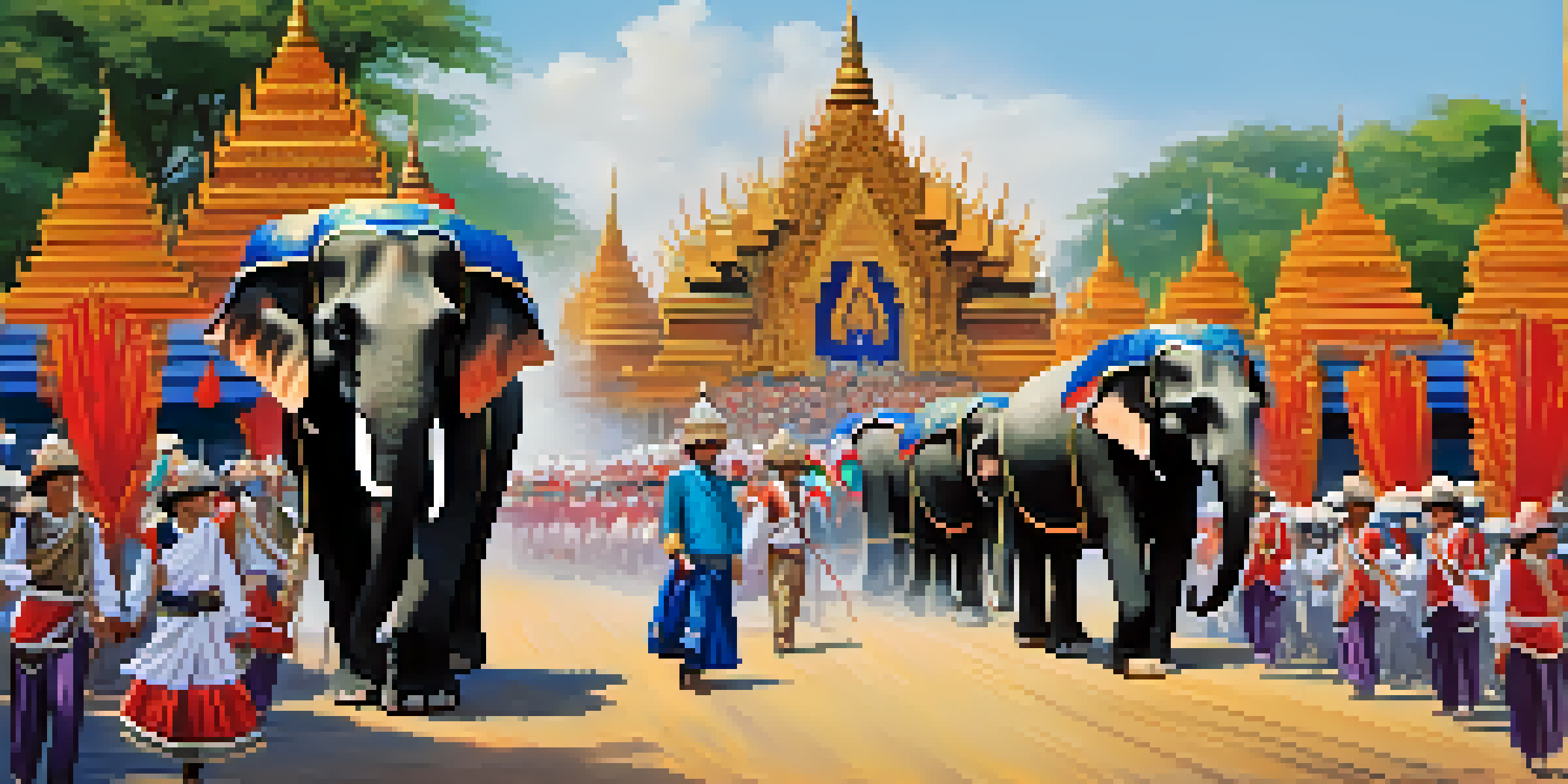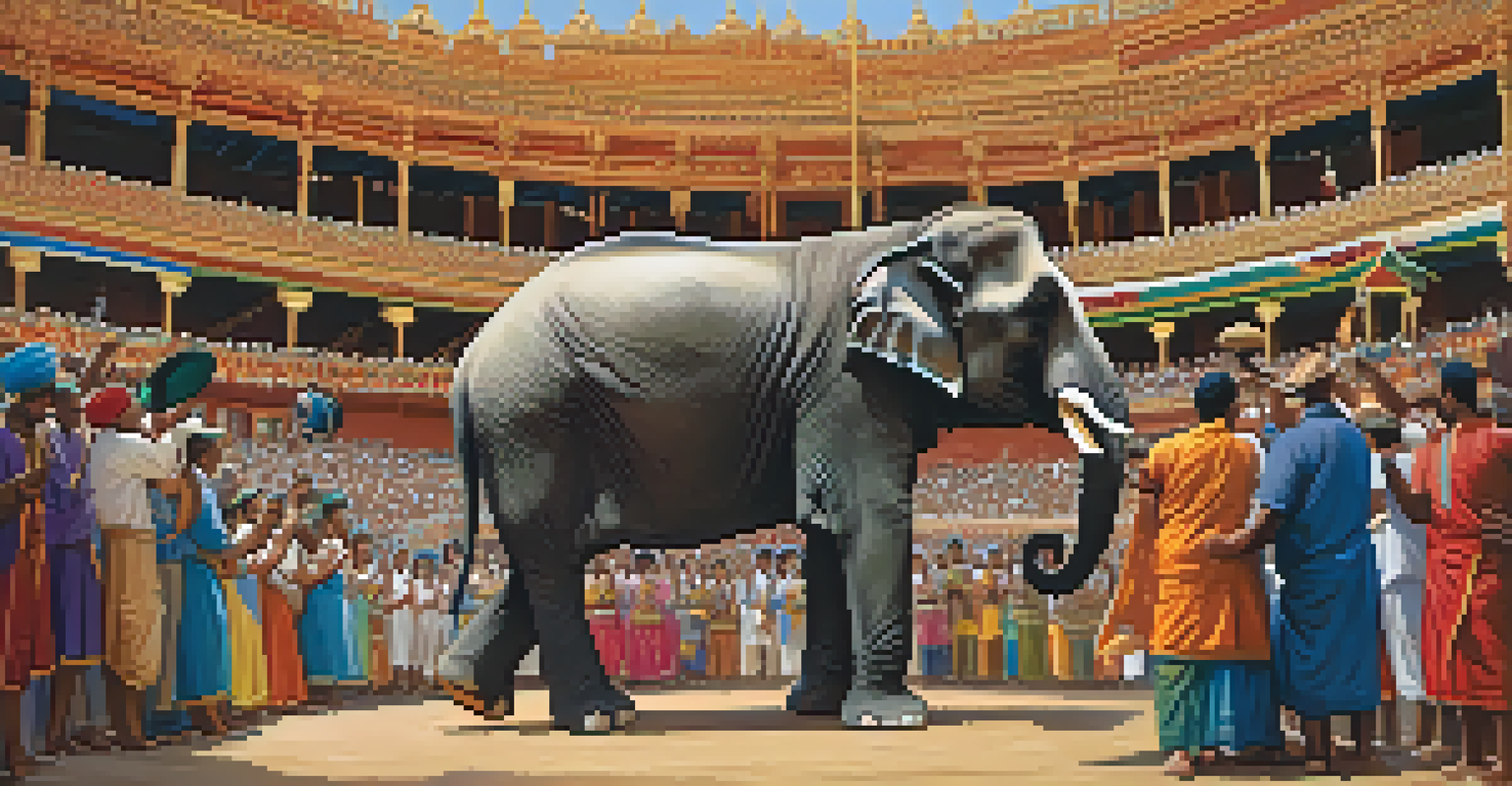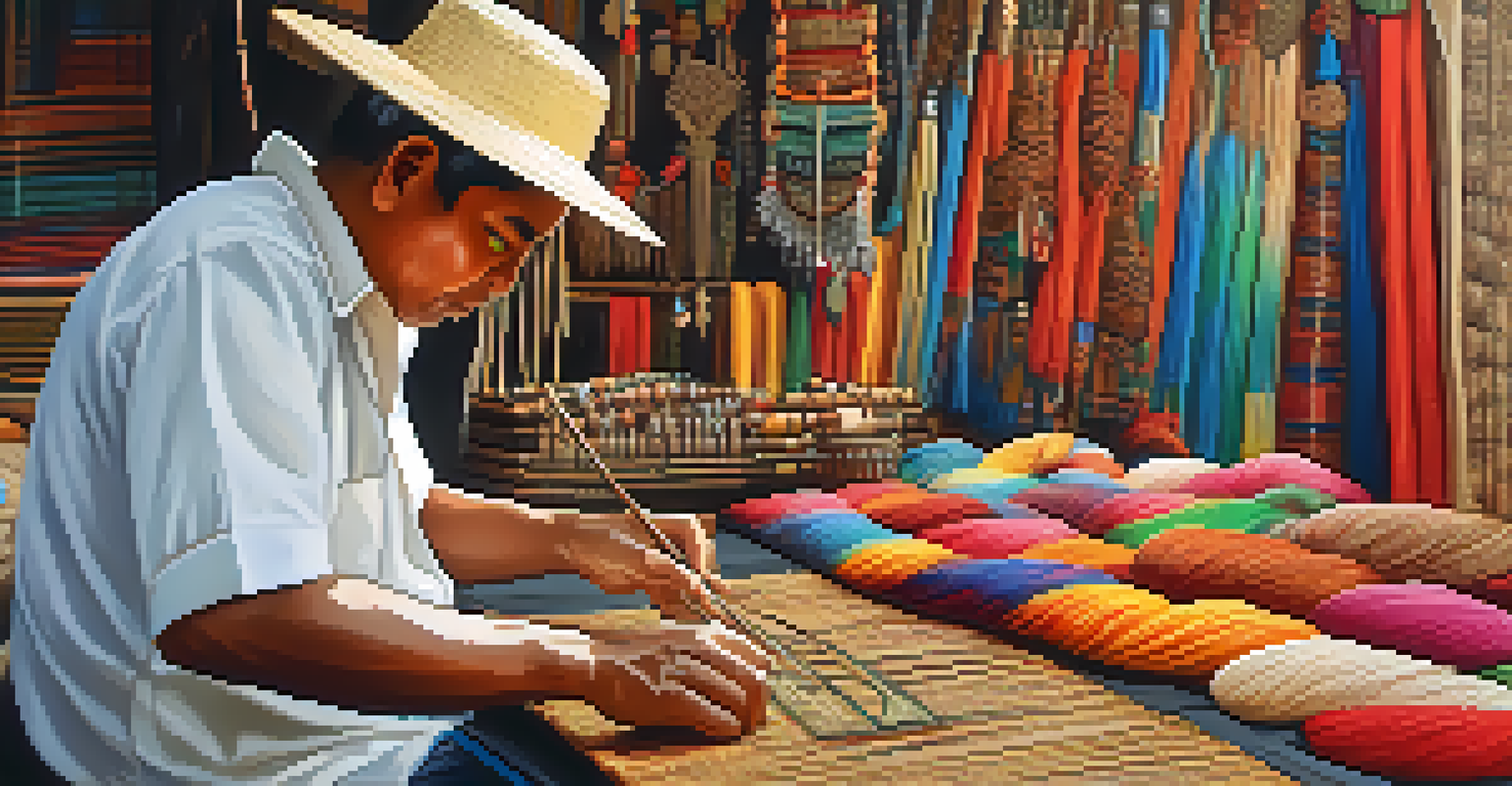The Cultural Heritage of the Thai Elephant Roundup Festival

The Origins of the Thai Elephant Roundup Festival
The Thai Elephant Roundup Festival has deep roots in the history of Thailand, particularly in the northern region of Surin. Traditionally, elephants were used for labor and transportation, playing a crucial role in the agricultural practices of Thai farmers. Over the years, this festival evolved from a practical gathering for work to a vibrant celebration of culture and community.
The greatness of a nation and its moral progress can be judged by the way its animals are treated.
In the early days, the roundup served as a way to showcase elephants' strength and training, which were essential for daily life. As time passed, the festival transformed into an event that honors these majestic creatures and their significance in Thai culture. It reflects the bond between humans and elephants, emphasizing respect and care for these gentle giants.
Today, the festival attracts thousands of visitors from around the world, eager to witness the unique traditions and festivities that honor the elephant's place in Thai history. It stands as a testament to how cultural practices can evolve while still preserving their core values and heritage.
The Significance of Elephants in Thai Culture
In Thailand, elephants are more than just animals; they are symbols of strength, wisdom, and loyalty. Throughout history, they have played a vital role in Thai society, from serving in royal ceremonies to helping with labor in rural areas. This deep-rooted connection is reflected in the reverence shown to elephants during the festival.

At the festival, the importance of elephants is highlighted through various activities, including traditional performances, parades, and contests that showcase their skills. These events not only entertain but also educate attendees about the historical roles of elephants in Thai culture. It’s a celebration that honors their contributions while aiming to promote conservation and protection of these endangered species.
Cultural Celebration of Elephants
The Thai Elephant Roundup Festival honors the historical significance of elephants in Thai culture through vibrant traditions and community engagement.
Moreover, the festival serves as a reminder of the need to preserve the natural habitats and welfare of elephants. As more people become aware of the challenges facing these creatures, events like the Elephant Roundup Festival help to foster a greater appreciation for their role in Thai heritage and the importance of ethical treatment.
Key Events at the Elephant Roundup Festival
The Elephant Roundup Festival is packed with exciting events that draw visitors in and keep them engaged. One of the main highlights is the grand parade, where dozens of elephants adorned with colorful decorations march through the streets of Surin. This spectacle not only showcases the beauty of these animals but also symbolizes the unity of the community in celebrating their heritage.
In every walk with nature, one receives far more than he seeks.
Another popular event is the elephant shows, where trainers demonstrate the incredible skills and intelligence of the elephants. These performances often include playful tricks, intricate dances, and even mock battles that tell stories from Thai folklore. The audience is captivated by the bond between the elephants and their handlers, which underscores the deep respect ingrained in Thai culture.
Additionally, the festival features local food stalls, handicraft markets, and cultural exhibitions that immerse visitors in the rich traditions of the region. This blend of entertainment and education creates a festive atmosphere, allowing attendees to experience the heart of Thai culture while honoring the majestic elephants.
Cultural Preservation Through the Festival
One of the remarkable aspects of the Thai Elephant Roundup Festival is its role in cultural preservation. By celebrating the connection between elephants and Thai history, the festival serves as a living museum that educates people about the traditions and practices of the past. It encourages younger generations to value and uphold these customs.
Local artisans play a significant role in this preservation effort, showcasing traditional crafts and skills that have been passed down through generations. From intricate wood carvings to hand-woven textiles, these works not only reflect the artistry of Thai culture but also ensure that the knowledge and techniques are not lost to time.
Tourism and Ethical Practices
The festival's growth is supported by tourism, which emphasizes the importance of maintaining ethical practices that respect both cultural heritage and elephant welfare.
Moreover, the festival promotes community involvement, as locals come together to organize events and share their stories. This collective effort reinforces the importance of cultural identity and encourages ongoing dialogue about the future of these traditions in a rapidly changing world.
The Role of Tourism in the Festival's Growth
As the Thai Elephant Roundup Festival gains popularity, tourism plays a significant role in its growth and sustainability. Tourists flock to Surin not just for the spectacle of the festival, but also for the chance to experience Thailand's rich cultural heritage firsthand. This influx of visitors generates revenue that supports local businesses and the economy.
However, with the rise in tourism comes the responsibility to ensure that the festival remains authentic and respectful of the elephants' well-being. Organizers are increasingly focused on promoting ethical tourism practices, encouraging visitors to engage with the festival in a way that honors the traditions and the animals involved.
By striking a balance between attracting tourists and preserving the cultural essence of the festival, the community can continue to celebrate their heritage while fostering an environment of respect and care for the elephants. This approach not only benefits the festival but also contributes to the larger conversation about sustainable tourism in Thailand.
Conservation Efforts Highlighted at the Festival
The Thai Elephant Roundup Festival goes beyond celebration; it also serves as a platform for raising awareness about elephant conservation. As the population of Asian elephants faces numerous threats, including habitat loss and poaching, the festival aims to educate attendees about the importance of protecting these magnificent creatures. Several organizations participate, providing information on their conservation efforts.
At the festival, attendees can engage with interactive exhibits that showcase the challenges elephants face and what can be done to help. Workshops and talks led by experts inform visitors about the ecological significance of elephants and the vital role they play in maintaining healthy ecosystems. This educational aspect fosters a sense of responsibility among attendees.
Conservation Awareness Efforts
The festival serves as a platform for educating attendees about elephant conservation, highlighting the need to protect these endangered species.
Furthermore, a portion of the festival's proceeds often goes toward elephant rescue and rehabilitation initiatives. By supporting these efforts, the festival not only celebrates the cultural heritage of elephants but also actively contributes to their preservation for future generations.
The Future of the Thai Elephant Roundup Festival
As we look to the future, the Thai Elephant Roundup Festival faces both challenges and opportunities. With the ongoing threats to elephant populations and changing attitudes toward animal welfare, it is crucial that the festival adapts to these realities. This means continuing to promote ethical treatment and conservation while maintaining the festival's vibrant traditions.
Engaging the younger generation is also key to ensuring the festival's longevity. By involving local youth in planning and organizing events, the festival can remain relevant and reflective of contemporary values while honoring its roots. This connection fosters a sense of pride and ownership in the community, which is essential for cultural continuity.

Ultimately, the festival's future lies in its ability to balance celebration with responsibility. By remaining committed to preserving both the cultural heritage of Thailand and the well-being of its elephants, the Thai Elephant Roundup Festival can continue to thrive as a cherished tradition for years to come.